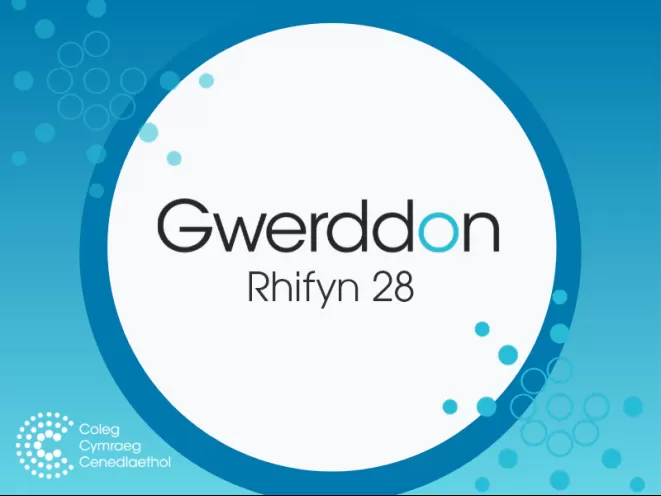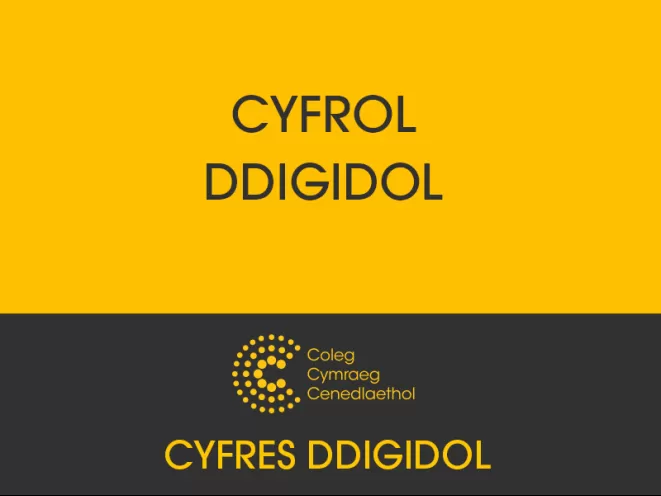Sefydlwyd cynllun Doctoriaid Yfory mewn partneriaeth â Llywodraeth Cymru, y Coleg Cymraeg Cenedlaethol ynghyd ag Ysgol Feddygol Caerdydd ac Ysgol Feddygol Abertawe gyda’r nod o gynyddu nifer y myfyrwyr Cymraeg eu hiaith sy’n ymgeisio’n llwyddiannus ar gyfer llefydd ar gyrsiau meddygol yng Nghymru. Yn yr categori hwn, gellir darganfod cyflwyniadau ac adnoddau sy’n gysylltiedig â’r cynllun.
Cydymaith i Gerddoriaeth Cymru – gol. Pwyll ap Siôn a Wyn Thomas
Cyfeirlyfr awdurdodol sydd yn cwmpasu holl gyfoeth cerddoriaeth yng Nghymru o’r 6ed Ganrif hyd at y presennol. Tros 500 o gofnodion yn amrywio o gerddoriaeth gynnar i gerddoriaeth gyfoes, o gantorion gwerin i gerddorfeydd. Ffrwyth prosiect cydweithredol rhwng Ysgol Cerddoriaeth a’r Cyfryngau ym Mhrifysgol Bangor a’r Coleg Cymraeg Cenedlaethol yw’r Cydymaith i Gerddoriaeth Cymru. Cyhoeddir Cydymaith i Gerddoriaeth Cymru ar ffurf llyfr clawr caled gan wasg Y Lolfa, Talybont gyda chefnogaeth a chymorth ariannol Y Coleg Cymraeg Cenedlaethol. Mae'r holl gynnwys hefyd ar gael ar Esboniadur Cerddoriaeth Cymru, sef adnodd agored ar-lein gan y Coleg Cymraeg Cenedlaethol.
‘’Does dim gwadu ar Etifeddiaeth’: A study of how John Gwilym Jones discusses legacy in Ac Eto Nid Myfi and a ...
One of the main themes in the work of John Gwilym Jones is how man is a slave to his chromosomes at the mercy of heredity and his environment. This article focuses on the said theme in his well-known play, Ac Eto Nid Myfi. In order to consider how John Gwilym Jones the author, as opposed to John Gwilym Jones the playwright alone, made use of this theme, due attention is given to a selection of his short stories. The article also discusses the influence of Darwin’s ideas of heredity on Realism as well as on John Gwilym Jones himself.
Ac Onide – J. R. Jones
Yma, mae J. R. Jones yn ymateb i argyfyngau dynol y ceir sôn amdanynt yn y Beibl ac i'r argyfyngau dynol yn ein hoes ni a gynhyrfodd feddylwyr tebyg i Wittgenstein, Simone Weil a Tillich. Ceir hefyd ffeil sain o J. R. Jones ei hun yn areithio. Teitl yr araith yw 'I Ti y Perthyn ei Ollwng', sef Rhan Tri: 3 o Ac Onide.
Darlith Flynyddol 2019: Teulu Wynniaid Gwedir
Darlith Flynyddol y Coleg Cymraeg Cenedlaethol 2019: Teulu Wynniaid Gwedir, gan John Gwynfor Jones.
‘Beth yw’r ots gennyf i am Gymru?’: The out-migration and aspirations of young people from the Welsh heartland...
This article considers the out-migration of young people from the Welsh-speaking heartlands in terms of their aspirations and hopes for the future. The original doctoral research (2014), is based on Hywel Jones’ (2010) work, which argues that young people born outside of Wales are four times more likely to migrate from Wales than young people born here. The research attempts to establish the main factors that affect rates of out-migration among young people born outside of Wales and those born into non-native families. The article concludes that the main drivers of rates of out-migration among this group are factors such as sense of belonging and the extent of community integration, rather than solely economic factors. In particular, it examines how culture, nationality, and considerations pertaining to the Welsh language have an impact on this trend, which has important implications in terms of the linguistic retention of the ‘traditional’ Welsh speaking areas.
Representation Theory and Symplectic Quotient Singularities
The first part of this article is an informal introduction to the representation theory of the symmetric group, which is intended for the working mathematician who knows no representation theory. In the second part we explain, more generally, how representation theory can be used to study symplectic quotient singularities. Namely, one can use representation theory to decide when these singular spaces admit crepant resolutions.
Periodic Table App
This is a Welsh medium periodic table app full of facts and pictures, and ideal for students, teachers, or anyone interested in chemistry.
Llawlyfr Technolegau Iaith
Mae’r llawlyfr hwn yn esbonio beth yw technolegau iaith ac yn ddisgrifio rhai o’r cydrannau mwyaf sylweddol yn ogystal â cheisio egluro’r dulliau a ddefnyddir i'w gwireddu. Mae wedi’i fwriadu ar gyfer myfyrwyr, datblygwyr, academyddion, swyddogion polisi, ac eraill sydd heb gefndir yn y maes ond sydd eisiau deall mwy am feysydd pwysig prosesu iaith naturiol, deallusrwydd artiffisial, technoleg cyfieithu a thechnoleg lleferydd. Mae'r llawlyfr hefyd ar gael ar wefan Porth Technolegau Iaith Cenedlaethol Cymru. Ysgrifennwyd gan swyddogion o Uned Technolegau Iaith, Prifysgol Bangor, a Cymen Cyf gyda chymorth grant bach gan y Coleg Cymraeg Cenedlaethol.
Prentis-iaith
These short courses are for apprentices who are keen to develop their confidence to use their Welsh in the workplace. They enable the apprentices to complete a part of their course through the medium of Welsh. There are four different levels: Awareness, Understanding, Confidence and Fluency and there is a quiz to determine which level is suitable for you.
‘Nudging is as important as the right to use the language’: behaviour change and Welsh language policy
A behavioural approach to policy has already been applied to a range of public policy challenges. This article explores and develops the relationship between a behavioural approach to policy and the field of language policy and planning. The Welsh Government’s recent language strategies offer some evidence of an embryonic relationship between the two fields, with the ambitious target of a million Welsh speakers offering policy imperative to the application of behavioural insights in support of revitalization efforts. This article explains that efforts to revitalize the Welsh language have depended on an understanding of behaviour that emphasizes the rational characteristics of behaviour. It is argued that this dependence neglects alternative understandings of behaviour and associated nudge policies.
From social drama to the pageant: theatre in the cultural exchange between Wales and north-east India
This article uses theatre as a lens in order to examine the cultural exchange between Wales and the Khasi and Jaiñtia Hills that is rooted in the history of the Welsh Calvinistic Methodist Overseas Mission present in north-east India between 1841 and 1969. Focusing on Khasi plays from the colonial period as well as an example of Welsh missionary performance staged in Wales in 1929, the article considers the extent to which Welsh conceptions of theatre and drama influenced native performances in the Khasi Hills, and correspondingly, to what extent the missionaries’ perception of India influenced the idea and the representation of the country in Welsh performative portrayals.









